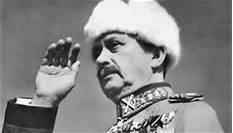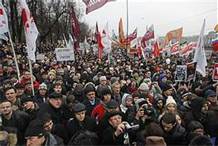
Washington in Botswana
What do you think would happen if someone produced a film about George Washington filmed in Botswana with a local actor playing the father of our country? What do you think people would say if all the Botswanan Washington did in this film was ride around Botswana thinking about war, peace but mostly about his marital problems? Would you feel confused? Outraged? Amused? Intellectually stimulated?
To my knowledge, no one in the USA has ever come upon the idea of Washington in Africa, but this cannot be said for the country of Finland. Finland has its own George Washington, of course. He was called Carl Gustav Mannerheim, and he was more like a combination of George Washington and Dwight D. Eisenhower with possibly a little Patton thrown in for good measure.
Mannerheim was born in 1867 to a noble Swedish-speaking family in Finland. He was educated and trained as an officer in Imperial Russia and in the early part of his life spoke Swedish, Russian and even German and French far better than he did his native Finnish. When the Russian Revolution broke out in 1917, Mannerheim returned to Finland and led the White Finnish armies against the Finnish workers and Russian soldiers and sailors who wanted a Finnish Revolution. The Whites under Mannerheim were victorious and Mannerheim became Regent of Finland from 1918–1919 until a president could be chosen.
Twenty years later, at the age of seventy plus, he became Commander-in-Chief of Finland’s defense forces as they made their gallant but ultimately hopeless attempt to defend themselves against the Russian colossus in the Winter War of 1939. He also served as commander of the Finnish forces through what is in Finland known as the “Continuation War,” (1941–1944) the war in which Finland allied herself with Germany to prevent a Russian invasion and also attempt to regain the territory she had lost to Russia in the previous conflict.
After the war was over, Mannerheim served as the 6th President of Finland from 1944-46. He died in 1951 at the age of 84, having been the soldier and statesman who, more than any other Finn, made it possible for his country to remain independent from Russia.
There are statues of Mannerheim all over Finland, the most famous in Helsinki astride his iron horse at the beginning of Alexander Street. He is revered in Finland in the unquestioning way we revere George Washington in this country. Whatever you might want to say about Mannerheim (he was a man who shared the prejudices of his class and time after all), he was there for Finland when it mattered.
So, yesterday, a film which deals with “Mannerheim as a person,” had its commercial premier at the 25th Helsinki International Film Festival, known fondly by the locals as “Love & Anarchy.” The film’s producer, Erkko Lyytinen, confessed himself perplexed at the firestorm of critique which has been raining down upon him over the last few weeks for choosing to film a story about the father of the Finnish nation, a man who never set foot in Africa or showed any particular interest in this continent, almost totally in Kenya with a Kenyan actor in the lead. Lyytinen simply said that the film was “a modern interpretation of the life of Mannerheim” and perhaps it was time Finland got something a bit new on the subject.
But does Finland want something new on the subject? Perhaps they prefer Mannerheim the way they have learned to regard him, as the untouchable hero of Finnish independence? Indeed, a poll by the Finnish evening newspaper Iltalehti revealed that 90% of the Finnish people said they would not watch the film when later this year it comes to television. Should they watch it? Would it be like swallowing a spoonful of cod liver oil? Hard going down, but good for you in the long run?
Many think so. There have been editorials in the Finnish newspapers defending the film-maker’s freedom of artistic expression and painstakingly explaining the concept of “distancing,” whereby an old theme is treated in a new and unexpected way thus allowing one to reflect more deeply upon it.
But many Finns, it would seem, like many Americans, are not interested in reflecting deeply upon certain people. They like their heroes set, and this film, which so breaks with the tradition of portraying Mannerheim standing tall in the Finnish snows, aristocratic and decisive, has produced a good deal of outraged commentary throughout Finland.
The least they could have done, wrote one reader of the Swedish-Finnish newspaper Hufvudstadsbladet, was allow the last veteran of the Continuation War to pass away before they made a film of Mannerheim as a Black African.
A lot of the commentary has been racist.
For others, whose tender feelings are not so outraged, the incongruity of the Kenyan film has fostered a good deal of hilarity. I myself confess to feeling mostly confused. But I am also a firm believer in the freedom of artistic expression, and should I ever have the opportunity to see the film Marshal of Finland, perhaps I would indeed be able to deepen my understanding of Mannerheim, the man.
In the meantime, I await some brave and innovative American independent filmmaker’s re- interpretation of George Washington, filmed perhaps in Asia, with a slender, black-haired Washington hoofing it through the jungle, sweaty and hot, worrying about what exactly Martha meant when she told him she needed to think about a thing or two while he was away.





Can’t wait to see it! “Life is like a mountain. Sometimes there’s uphill and sometimes there’s… DOWNHILL.”: http://www.youtube.com/watch?v=upP-QNtrlqU
I look forward to seeing this film…as an ardent student of History, especially European History and even more specifically the era around WWII as that period created me, I love the idea that time creates historical mythology that sometimes needs to be shaken and looked at with a “new” eye and that might create a better knowledge or at least respect of what actually took place…Many of the world’s “Heros” were pretty human with carious biases and stupid acts and thought that often disappear as time marches on and the myths outweigh the realities of events.
Representing a European as an African with the unique situations and problems that continent adds to the factual history of the characters, is interestingly unique and I think would be good for some of America’s heroes also…
You can get a job as Mr. Lyytinen’s publicist. I think he needs you.